News
July 30th, 2018

Professorship accepted
Dr. Dominik Collet, the leader of the research group, has accepted a professorship at the University of Oslo. He will research and teach in the fields of environmental/climate history as well as early modern history and support the establishment of the new Oslo School for Environmental Humanities (OSEH). For more information please see the website of the department.
July 15th, 2018
New Press features
The Berliner Zeitung published a report that features the work of the research group (in German): (download)
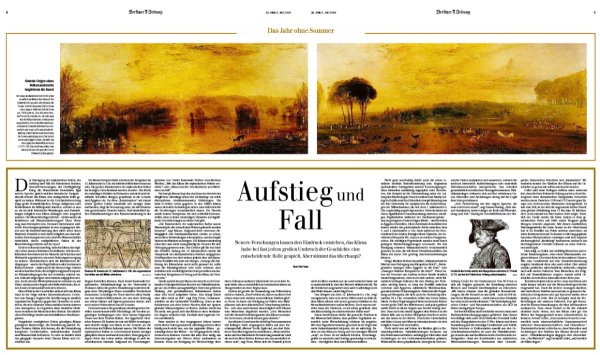
The climatological 'detective work' of fellow Maximilian Schuh also features in the latest edition of Ruperto Carola magazine (English abstract): download
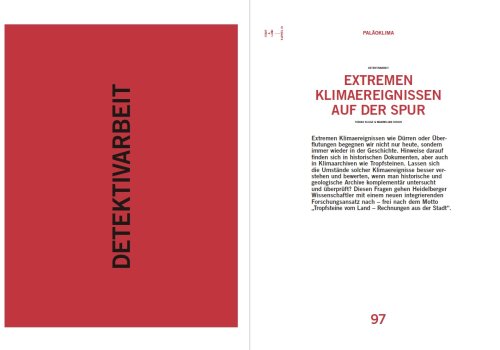
March 19th 2018
New Research Fellow
 From May 2018 Heli Huhtamaa will join the research group as PostDoc research fellow for 18 months. Her stay is financed by an SNF Fellowship.
From May 2018 Heli Huhtamaa will join the research group as PostDoc research fellow for 18 months. Her stay is financed by an SNF Fellowship.
Helis Project "Climate extremes and population dynamics in the northern Baltic Sea region prior the industrialization" explores the entanglement of climate variability and population change. It employs a multi-disciplinary approach to connect dendrochronological data with demographic, meteorological and historical sources. When compiled, her data series from southern Finland will be one of the longest overlapping climate and population time-series available world-wide. The project will provide empirical data to better understand possible population long-term responses of future climate change.
Heli joins us from Bas van Bavels research group in Utrecht (NL), where she worked on the project: "Coordinating for Life: Success and Failure of Western European Societies in Coping with Rural Hazards and Disasters, 1300-1800". In 2017 she earned a double doctorate from the Universität Bern and the University of Eastern Finland. More information: http://www.hist.unibe.ch/ueber_uns/personen/huhtamaa_heli/index_ger.html
February 20th 2018
Dominik Collet completes his Habilitation

Dominik Collet, the leader of the research group, has successfully completed his formal Habilitation. The Philosophische Fakultät of Heidelberg University awarded him the licence to teach the subject of Modern and Contemporary History at all levels and appointed him as Privatdozent.
For his formal faculty colloquium Dominik presented a talk on "The Anthropocene. A challenge for the Humanities" . His Habilitationsschrift / second book on "Natural Environments, Social Respones. Entanglements of Climate and Culture during the European Famine of 1770-72" examines a key area of the research group. It uses one of the most severe anomalies of the Little Ice Age to trace how early societies coped with extreme climate events. It will be published a a book in autumn 2018 in the Environment and Society series of Vandenhoeck & Ruprecht.
October 26th 2017
Public talk: Building Natures
The research group co-hosts a city talk on urban natures, ecology and aesthetics. The event will introduce loka (IBA heidelberg) and global perspectives. It will talke place on November 3rd at 15h in the Karl Jaspers Center. Details here.
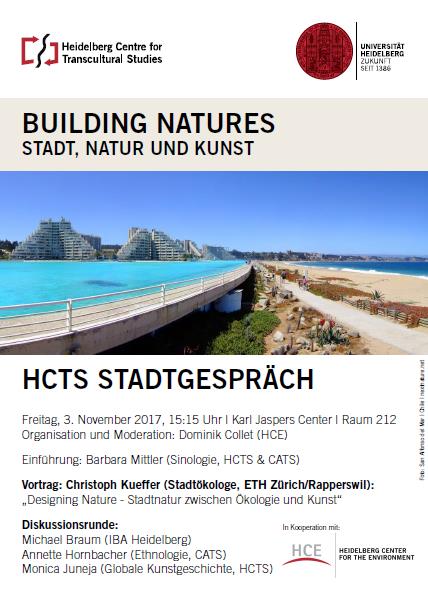
October 15th, 2017
New Publication: Famines in Europe
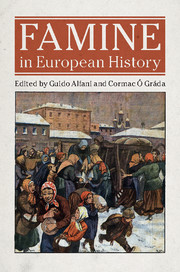
Dominik Collet and former research fellow Daniel Krämer have contributed a chapter on German-speaking Europe to the first systematic study of famines in all parts of Europe. The case studies range from Scandinavia and Italy to Ireland and Russia and compare the characteristics, consequences and causes of famine. The chapters also take full account of demographic, institutional, economic, social and cultural aspects, providing a wealth of new information which is organized and analysed within a comparative framework. Famine in European History represents a significant new contribution to all those who want to discover more about famines - truly horrific events which, for centuries, have been a recurring curse for the Europeans.
Dominik Collet / Daniel Krämer: Germany, Switzerland and Austria, in: Guido Alfani / Cormac Ó Gráda (ed.), Famine in European History, Cambridge 2017, p. 101-118.
More information here
August 15th, 2017
New Publication: Famines During the 'Little Ice Age'
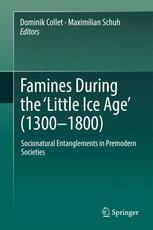
Famines occur at the interface of nature and culture, but are often studied in narrow, disciplinary settings. This volume documents the boundary-work of the research group. It brings together researchers from the sciences and the humanities to challenge deterministic approaches to human-environment interaction. Integrating the "archives of nature" with the "archives of man" it provides a fresh perspective on the entanglement of climate and culture in past societies.
You can browse contents and order copies here.
For a review of the book go here.
Dominik Collet and Maximilian Schuh. 2017. Famines During the 'Little Ice Age' (1300-1800). Socionatural Entanglements in Premodern Societies. Heidelberg: Springer.
October 10th, 2016
Public lecture series "Environmental Humanities"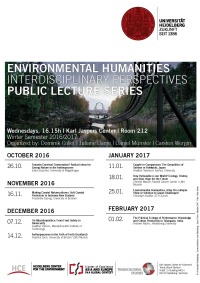
The research group co-hosts a series of talks on "Environmental Humanities. Interdisciplinary perspectives."
Please find details on speakers, dates, and venues on the poster.
September 1st, 2016
New video featuring the research group (in german)
May 24th, 2016
Press feature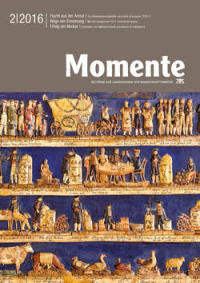
The German magazine "Momente" reports on the work of the research group (download pdf).
You can order the whole issue focusing on the "Year Without Summer 1816" here.
April 5th, 2016
Hunger and Famine in Medieval Societies.
The Junior Research Group at the International Medieval Congress 2016
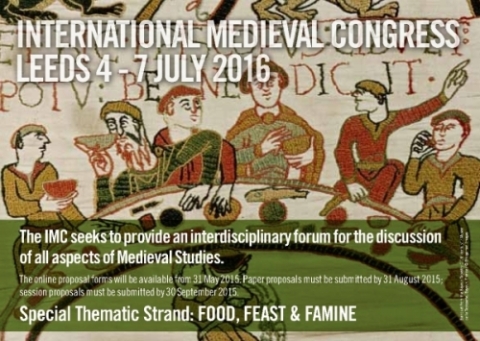
In July the Junior Research Group presents a session at the International Medieval Congress in Leeds, the biggest conference for humanities in Europe.
Meet us July 4th from 14:15-18:00 in Leeds! More information here.
Hunger and Famine in Medieval Societies
Medieval societies were extremely vulnerable to hunger and famine. Climatic impacts as well as changing social and political conditions quickly resulted in catastrophes that affected many people. The session examines causes, courses, and consequences of famines in the high and late Middle Ages. Crusading armies in the 12th century, English society in the beginning of the 14th century, and the population of Rouen during the Hundred Years War were all hit by hunger and famine. Similarities and differences of these events are discussed to improve the general understanding of medieval famines.
Panel: Environmental Impacts and Societal Responses: Interdisciplinary Approaches to Pre-Modern Famines, I
Monday, July 4th, 2016 14:15-15:45
Chair: Dominik Collet, Heidelberg Center for the Environment, Ruprecht-Karls-Universität Heidelberg
Pre-modern societies relying on agrarian production were extremely vulnerable to hunger and famine. Adverse climatic impacts as well as changing political, social and economic conditions quickly resulted in catastrophes that affected many people. The session series examines causes, courses, and consequences of famines in the Middle Ages and the Early Modern Period from an interdisciplinary, transepochal, and global perspective. Natural and cultural aspects of famines as well as their entanglement are in the focus of the session series. The contributions of the first session discuss dendrochronological evidence from the archives of nature, correlate them with written evidence from premodern Finland and identify detectable causes of famines in medieval Hungary. Thus the advantages and problems of including data from the natural sciences in historical research can be discussed.
Ask the Trees! Dendroclimatology as an Approach to Reconstruct Extreme Weather Events Leading to Famine
Carolin Rethorn, Heidelberg Center for the Environment, Ruprecht-Karls-Universität Heidelberg
Climate, Crop Failure, and Famine in Pre-Modern Finland: Tree-Ring Evidence for Climate-Society Interactions
Heli Huhtamaa, Historiches Institut, Universität Bern / Department of Geographical & Historical Studies, University of Eastern Finland
Hungry Hungary: Food Shortage, Need, Famine, and Their Detectable Causes in Medieval Hungary
Andrea Kiss, Institut für Wasserbau und Ingenieurhydrologie, Technische Universität Wien / University of Szeged
Panel: Environmental Impacts and Societal Responses: Interdisciplinary Approaches to Pre-Modern Famines, II
Monday, July 4th, 2016 16:30-18:00
Chair: Christian Rohr, Abteilung für Wirtschafts-, Sozial- und Umweltgeschichte, Universität Bern
The second session on causes, courses, and consequences of famines in the Middle Ages and the Early Modern Period stresses trans-epochal and global perspectives. The contributions discuss evidence of weather impacts on the agrarian production in English manorial accounts, the role of trade and markets in late medieval and early modern Switzerland and the massive consequences of monsoon failure and draught for late Mughal South Asia. Combining the different perspectives presented in the two sessions aims at improving the general understanding of famines in premodern societies as common features as well as specific differences can be identified.
Weather and Its Impacts on Agrarian Production in Early-14th-Century England: Evidence From the Winchester Pipe Rolls
Maximilian Schuh, Historisches Seminar, Ruprecht-Karls-Universität Heidelberg
Trade, Markets, and Famine in the Territory of the Swiss Confederacy from the 14th to the 16th Centuries
Chantal Camenisch, Abteilung für Wirtschafts-, Sozial- und Umweltgeschichte, Universität Bern
Monsoon Failure, Drought, and Famine in Late Mughal South Asia: Social Consequences in Bengal
Dario Kaidel, Heidelberg Center for the Environment, Ruprecht-Karls-Universität Heidelberg
Jan 26th, 2016
Workshop "Teleconnections of environment and society in the 14th century", DHI Rom, Feb. 24-26, 2016
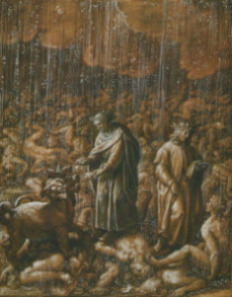
Jan van der Straet/Giovanni
Stradano: Illustration to Dante's
Divine Comedy, Canto VI:
The Gluttons are tortured by
eternal rain.
Source: Wikimedia Commons
The research group is co-hosting a workshop on "The Crisis of the 14th Century: 'Teleconnections' between Environmental and Societal Change?"
The conference will take place at the German Historical Institute in Rome on Feb. 22-24, 2016. It is organised in cooperation with Prof. Dr. Gerrit Schenk and Dr. Martin Bauch (TU Darmstadt).
You can find an English description here.
Conference programme:
Wednesday, 24 February 2016
09:30 Martin Baumeister (DHI Rome)
Welcome
09:45 Gerrit J. Schenk (TU Darmstadt) and Martin Bauch (DHI
Rome)
Introduction
10:00 Chair: Francesco Salvestrini
Paolo Nanni (University Firenze)
Climate Variability in Italy during the first half of the 14th Century:
Historical data and research questions
Martin Bauch (DHI Rome)
A truly 'Dantean' anomaly? Bologna and Siena between 1310 and
1321
11:30 Coffee break
11:45 Christof Paulus (LMU Munich)
The defense of the crisis, or: An emperor-monk explains his world
Mihailo Popovic (ÖAW, Vienna)
Did the Little Ice Age have an observable impact on the southern
Balkan peninsula in the first half of the 14th century?
13:15 Lunch break (Snacks in the foyer of the DHI)
14:30 Chair: Richard C. Hoffmann
Andras Vadas (CEU Budapest)
When was the beginning of the Little Ice Age in the Carpathian
Basin?
Chantal Camenisch (University Bern)
14th century sources in the area of modern Switzerland and their
potential for environmental and climate history
16:00 Coffee break
16:30 Rainer Schreg (RGZM Mainz)
Plague and desertion - a consequence of anthropogenic
landscape change? Archaeological Studies in Southern Germany
Thursday, 25 February 2016
09:30 Chair: Dominik Collet
Thomas Labbe (University Dijon)
The crisis of 1315 between Lyon, Macon and Geneva? A Study
with Rural Economic Sources
Peter Brown (Durham University)
The extreme windstorm of AD 1362: Contemporary perceptions
and responses
11:00 Coffee break
11:30 Phil Slavin (University of Kent, Canterbury)
Was Malthus right? Re-assessing the role of demography in
pre-industrial famines - the case of late-medieval British Isles
Maximilian Schuh (HCE Heidelberg)
Narratives of environmental impacts in English sources of the
early 14th century
13:00 Lunch break (Snacks in the foyer of the DHI)
14:00 Chair: Gerrit J. Schenk
Ulla Kypta (University Basel) and Angela Huang (University
Copenhagen)
Climatic change and inter-city cooperation
Heli Huhtamaa (University of Eastern Finland/University
Bern)
Climate and the great famine in north-east Europe
16:00 Coffee break
18:00 Public evening lecture: Bruce M.S. Campbell (Belfast
University)
The environmental origins of the Black Death
Friday, 26 February 2016
09:30 Chair: Bruce M.S. Campbell
Ronnie Ellenblum (Hebrew University, Jerusalem)
The first half of the 14th century in the eastern Mediterranean
- a period of wealth?
Tana Li (ANU Canberra)
Climatic impacts in Vietnam and southern China 1280-1360
11:00 Coffee break
11:30 Jürg Luterbacher (JLU Gießen)
Climatological commentary
Gerrit J. Schenk and Martin Bauch
Concluding remarks
ca 12:30 End of the conference
Nov. 1st, 2015
Radio feature on our research
![]()
German public radio station Deutschlandfunk has a report on the HCE and the work of the Junior Research Group. The feature charts cooperation between science and humanities in climate research. Dominik reports on methods and results of the team.
The feature is available for listening and reading.
Sep 01st, 2015
New team member: Divya Narayanan
Divya joins the group with her new project “Climate Change and Famine in Seventeenth and Eighteenth Century North India”.
She has recently completed her PhD on Food History in Early Modern India. For her new project she will look at responses to environmental challenges in North India combining Persian documents with archeological and paleoclimatological records. You can find her project description here.
May 07th, 2015
Workshop "Famines during the Little Ice Age" – reviews
The international workshop of the research group Famines during the 'Little Ice Age' (1300-1800). Socio-natural entanglements in premodern societies has been well-received. The participants from the historical sciences and paleoclimatology entered into an intense and construcutive debate, that explored famines as a crucial interface of human-environment interactions. A publication of the revised contributionsis planned for 2016.
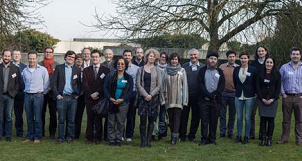
The German newspaper F.A.Z. featured the workshop.
Our review of the event has been published in the ZiF Mitteilungen.A conference report with detailed informations on the presentations can be found here.
Feb. 15th, 2015
Workshop: The Crisis of the 14th Century
The research group will co-host a workshop on “The Crisis of the 14th Century: ‘Teleconnections’ between Environmental and Societal Change?” with Dr. Martin Bauch and Prof. Dr. Gerrit Schenck. The event will be held at the Deutsches Historisches Institut in Rome, February 22nd-24th 2016.
The first half of the 14th century, with its relatively rapid transition from the so-called Medieval Climate Anomaly to the so-called Little Ice Age, is the first time in history that a change from one climatic regime to another is assessable not primarily by scientific data only. At the same time, this climactic change can also be detected in comparatively good written records on meteorological and social phenomena of change. The idea of the ‘crisis of the 14th century’ is a well established interpretational pattern for numerous developments and problems of late medieval societies in Europe. However, this interpretation has been criticized as a contemporary projection of the crisis-ridden 20th century. Certainly the narrative of crisis does not apply to all developments after 1300, but if we focus on the natural framework of the time this might help sharpen our knowledge about the processes through which environmental change contributed to socio-economic crisis.
The increasing frequency of extreme natural events and their impact on societies is hard to deny: The first huge onslaught of plague, the Black Death of 1347-51, has always attracted the attention of research but the wet and cold years from 1345 onwards are yet to be analysed in detail. The interest in the “Great Famine“ (1315-21), which is believed to have affected above all North-western Europe, has become stronger in the past few years. New fields of investigation are added to the analysis of epidemics and famines: There is emerging research on epizootics and flood events such as St. Mary Magdalene’s Flood of 1342, which led to massive erosion, or the ‘Grote Mandrenke’ storm surge of the year 1362 at the North Sea coast. At the same time counteractions of the affected societies can be observed. These include the construction of embankments and dikes, grain provision and the organization of municipal health care. On the cognitive level, a newly awakened interest in reception and interpretation of meteorological phenomena by late medieval witnesses is clearly visible and is not limited to interpretations based on astro-meteorology and theology of punishment.
The conference will focus on the supposed climatic deterioration since 1300, discussing its presumed impact on economy and society, and the possibly related epidemic, cultural and political phenomena. In the context of this meeting, the meteorological term ‘teleconnections‘ describes the occurrence of causal correlations between (not only geographically) distant areas: Here, we deal with the direct and indirect impact of meteorologically extreme events on medieval societies between 1280 and 1380. Geographically, the investigation will focus on not only the relatively well explored Northwestern Europe but the equally important areas of Southern and East-Central Europe. Additionally, a global perspective will be opened within the realms of possibility.
For more information please contact bauch@dhi-roma.it
February 04th, 2015
New Publication
A new volume on environmental history coedited by Dominik Collet has just been published. This volume focuses o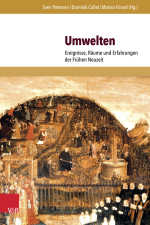 n nature, religion and politics - three “environments” of early modernity.
n nature, religion and politics - three “environments” of early modernity.
Exemplary studies from pietism research, historical disaster studie
s, interdisciplinary environmental history and the history of transnational connectivity provide close-up insights into a plurality of lifeworlds and environments. Seen as a whole, these perspectives offer a broader understanding of early modern “environments” as material as well as cultural contexts of historical events and experiences, and encourage the crossing of the boundaries between established fields of research.
January 15th, 2015
Research Fellow: Heli Huhtamaa

During February 2015 Heli Huhtamaa will join the group as research fellow. Heli examines the climate-human relationships in North-East Europe prior to the industrial era, focusing on the impacts of extreme climatic events on food systems. By analysing natural evidence, such as tree-ring proxies, and written historical sources, her aim is to explore how and why food system response to climatic fluctuations has varied spatially and temporally in the past. Her dissertation’s theoretical framework is guided by the disciplinary traditions of climate science and history in order to address the research questions adequately by the standards of both disciplines. She is conducting her doctoral research in joint-supervision at the University of Eastern Finland and at the University of Bern. She did a MA in History (2011) and MSc in Geography (2012) at the University of Eastern Finland.
For more information about her person and her doctoral research please refer here.
January 13th, 2015
Workshop of the research group: Famines during the 'Little Ice Age' (1300-1800). Socio-natural entanglements in premodern societies

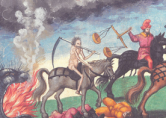 The workshop will bring together researchers from the natural and social sciences as well as the humanities. With reference to recent interdisciplinary concepts (disaster studies, vulnerability studies, environmental history) it will examine, how the dominant opposition of natural and cultural factors can be overcome. Such an integrated approach includes the "archives of nature" as well as "archives of man". In this way, deterministic models can be tested and replaced with a dynamic, historicising approach to the events. During the discussion we are seeking answers to the following topics:
The workshop will bring together researchers from the natural and social sciences as well as the humanities. With reference to recent interdisciplinary concepts (disaster studies, vulnerability studies, environmental history) it will examine, how the dominant opposition of natural and cultural factors can be overcome. Such an integrated approach includes the "archives of nature" as well as "archives of man". In this way, deterministic models can be tested and replaced with a dynamic, historicising approach to the events. During the discussion we are seeking answers to the following topics:
- Which data, sources and case studies can make integrative approaches work?
- Which concepts and research designs overcome both climatically and culturally deterministic models?
- How can we improve our understanding of the entanglement and co-development of environment and society as well as the cultural consequences of extreme natural impacts?
- How can we uncover the complex historical perceptions, interpretations and coping strategies?
Program
Wednesday, 18 February 2015 |
|
|
20:00 |
Conference dinner downtown |
Thursday, 19 February 2015 |
|
| 09:00 | Welcome addresses and introduction |
|
Research Approaches and Designs |
|
| 09:30 |
Ulf Büntgen (Zürich): A tree-ring perspective on "Little Ice Age" summer temperature |
| 09:50 |
Katrin Moeller (Halle): Halle und die Hungerkrise von 1805. Ein Plädoyer für neue |
| 10:20 |
Christian Jörg (Tübingen): Forgotten crises of the medieval warm period. Researching |
| 10:40 | Coffee break |
| 11:15 |
Jürg Luterbacher (Gießen): From proxies to integrated, statistically based "Little Ice Age" climate |
| 11:35 | Discussion |
| 12:00 | Lunch break |
|
European Famines |
|
| 14:00 |
Heli Huhtamaa (Bern/Joensuu): Exploring climate-driven food crises in Finland during the Little Ice |
| 14:20 |
Francis Ludlow (Yale): Dynamics of extreme weather, Subsistence crises and violent conflict |
| 14:40 |
Rudolf Brazdil (Brno): Famines in the Czech Lands during the "Little Ice Age" |
| 15:00 |
Guido Alfani (Milano): Italian famines: An overview (ca. 1250-1800) |
| 15:30 | Coffee break |
| 16:00 |
Bruce Campbell (Belfast): Climate and disease: The famine of 1346-7 and near-famine of |
| 16:20 | Discussion |
| Break | |
| 18:00 |
Evening lecture: Andrea Fadani (Ulm): Hunger remembrance in a museological context: Any linkage to |
| 19:00 | Dinner at ZiF |
Friday, 20 February 2015 |
|
|
Global perspectives and coping strategies |
|
| 09:30 |
Vinita Damodaran (Sussex): Climate signals, environment and livelihoods in seventeenth and |
| 09:50 |
Andrea De Vincenti (Zürich): Educationalizing hunger. Perceptions of the famine of 1771/72 in |
| 10:10 |
Steven Serels (Berlin): Reconstructing patterns of human-environment interaction and |
| 10:30 | Discussion |
| 11:00 | Coffee break |
| 11:30 |
Kathrin Pindl (Regensburg): Crises and strategies of subsistence in pre-modern Regensburg. |
| 11:50 |
Andreas Rüther (Bielefeld): Theory of migration vs. colonization thesis? Concurrent concepts |
| 12:30 | Lunch break |
| 14:00 |
Jessica Dijkman (Utrecht): Coping with food shortages in the village of Berkel (Holland), late |
| 14:20 | Discussion |
| 14:45 | Final discussion |
| 15:15 | End of conference |
| 19:00 | Dinner downtown (self-pay) |

